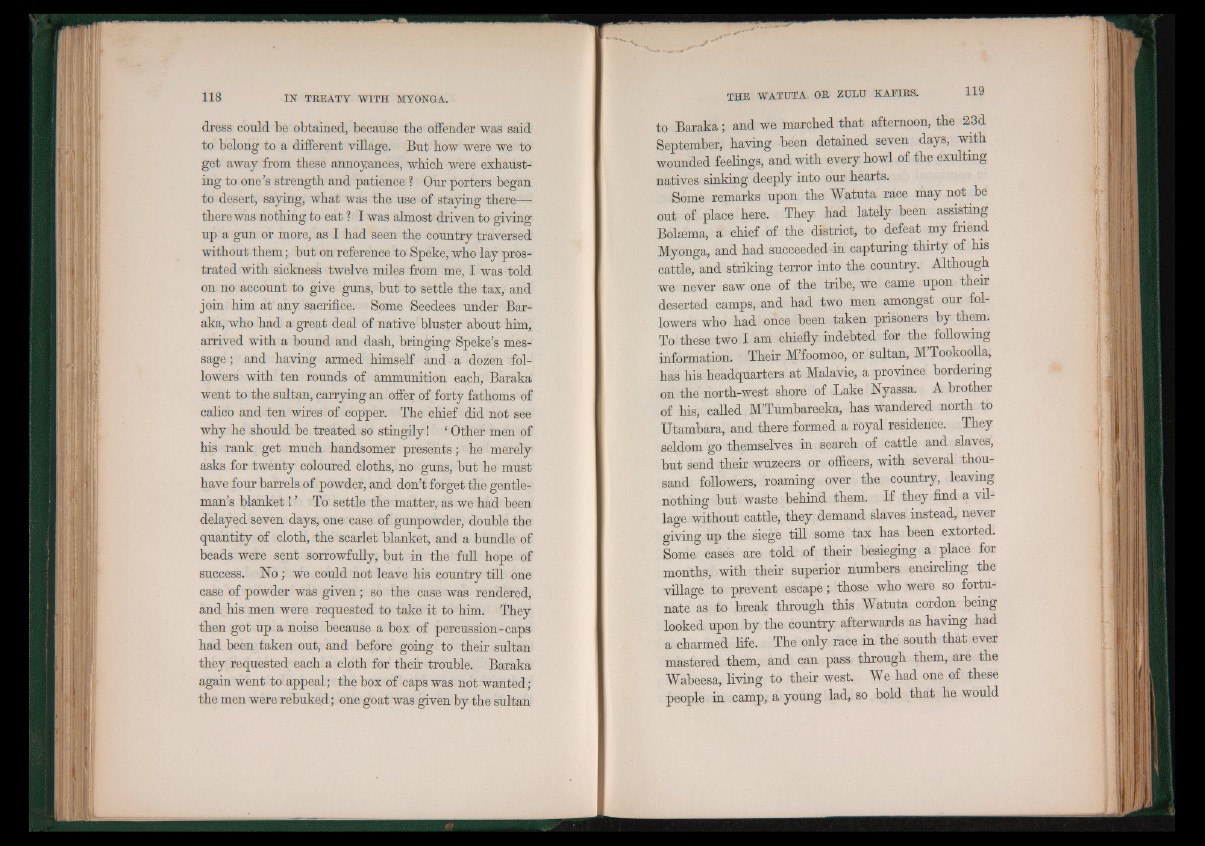
dress could be obtained, because the offender was said
to belong to a different village. But bow were we to
get away from these annoyances, which were exhausting
to one’s strength and patience ? Our porters began
to desert, saying, what was the use of staying there—
there was nothing to eat ? I was almost driven to giving
up a gun or more, as I had seen the country traversed
without them; but on reference to Speke, who lay prostrated
with sickness twelve miles from me, I was told
on no account to give guns, but to settle the tax, and
join him at any sacrifice. Some Seedees under Baraka,
who had a great deal of native bluster about him,
arrived with a bound and dash, bringing Speke’s message
; and having armed himself and a dozen followers
with ten rounds of ammunition each, Baraka
went to the sultan, carrying an offer of forty fathoms of
calico and ten wires of copper. The chief did not see
why he should be treated so stingily! ‘ Other men of
his rank get much handsomer presents; he merely
asks for twenty coloured cloths, no guns, but he must
have four barrels of powder, and don’t forget the gentleman’s
blanket! ’ To settle the matter, as we had been
delayed seven days, one case of gunpowder, double the
quantity of cloth, the scarlet blanket, and a bundle of
beads were sent sorrowfully, but in the full hope of
success. No; we could not leave his country till one
case of powder was given; so the case was rendered,
and his men were requested to take it to him. They
then got up a noise because a box of percussion-caps
had been taken out, and before going to their sultan
they requested each a cloth for their trouble. Baraka
again went to appeal; the box of caps was not wanted;
the men were rebuked; one goat was given by the sultan
to Baraka; and we marched that afternoon, the 23d
September, having been detained seven days, with
wounded feelings, and with every howl of the exulting
natives sinking deeply into our hearts.
Some remarks upon the Watuta race may not be
out of place here. They had lately been assisting
Bolaema, a chief of the district, to defeat my friend
Myonga, and had succeeded-in capturing thirty of his
cattle, and striking terror into the country. Although
we never saw one of the tribe, we came upon their
deserted camps, and had two men amongst our followers
who had once been taken prisoners by them.
To these two I am chiefly indebted for the following
information. Their M’foomoo, or sultan, M’Tookoolla,
has his headquarters at Malavie, a province bordering
on the north-west shore of Lake Nyassa. A brother
of his, called M’Tumbareeka, has wandered north to
Utambara, and there formed a royal residence. They
seldom go themselves in search of cattle and slaves,
but send their wuzeers or officers, with several thousand
followers, roaming over the country, leaving
nothing but waste behind them. If they find a village
without cattle, they demand slaves instead, never
giving up the siege till some tax has been extorted.
Some cases are told of their besieging a place for
months, with their superior numbers encircling the
village to prevent escape; those who were so fortunate
as to break through this Watuta cordon being
looked upon by the country afterwards as having had
a charmed life. The only race in the south that ever
mastered them, and can pass through them, are the
Wabeesa, living to their west. We had one of these
people in camp, a young lad, so bold that he would